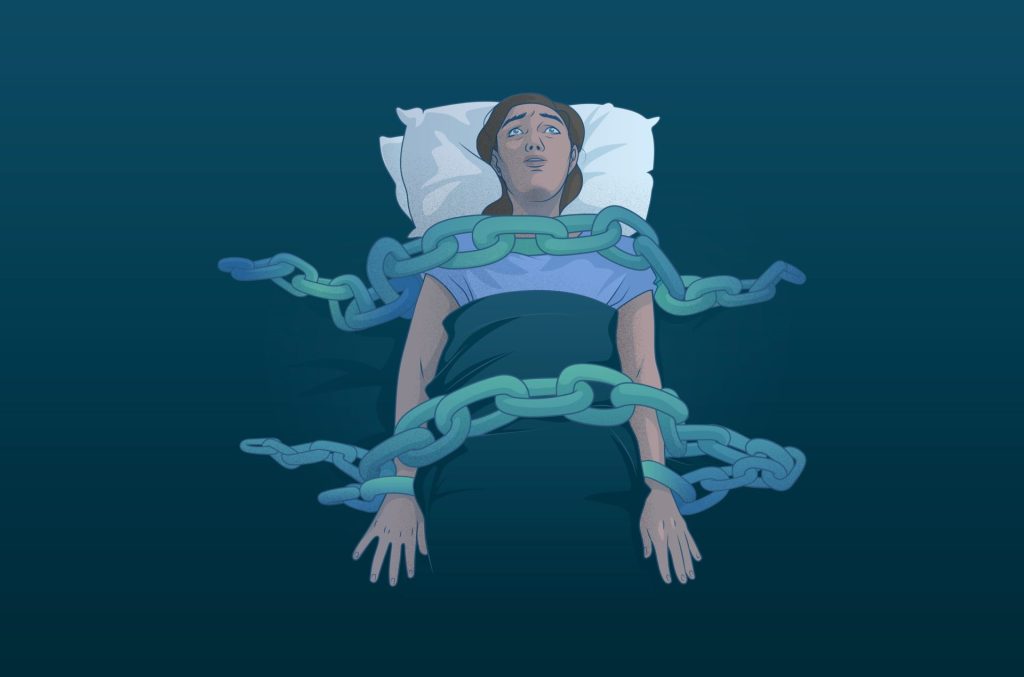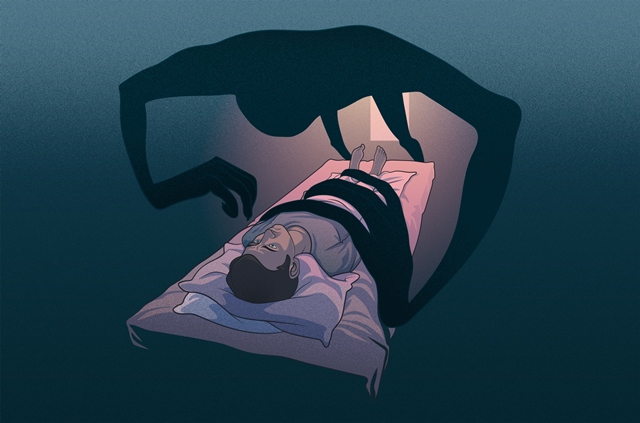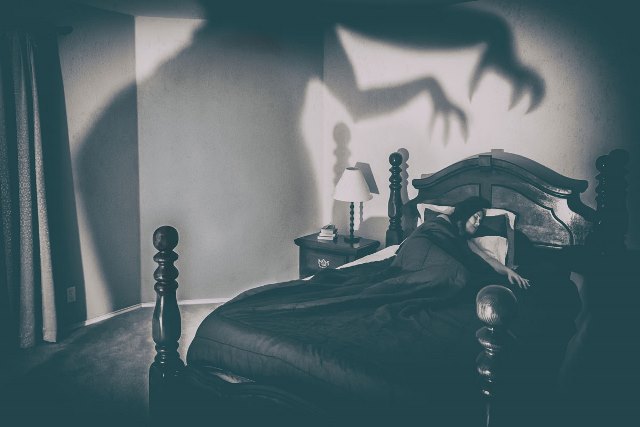Last Updated on May 15, 2023
Africans are superstitious, and it’s no secret that most of these beliefs originate from the continent. Part of this is attributing sicknesses or diseases to demonic attacks, e.g., Sleep Paralysis. But Africans are not the only ones who believe in the sleep paralysis demon. In fact, many people around the world are convinced that it is a spiritual attack. The fact that this happens more often at night – not when you’re napping during the day – learns more weight to the belief there is something sinister about sleep paralysis. But is it true? Wherever you’re from around the world and regardless of your innate beliefs about sleep paralysis, we’ll explain what it means and why it happens here.

What is Sleep Paralysis?
Sleep paralysis is a condition in which a person cannot move or speak while sleeping or after waking up. It is a type of sleep disorder that can cause great distress and even terror. It can occur in any sleep stage, but it is most likely to occur in REM (rapid eye movement) sleep. A person is conscious but cannot move their body. Most people feel like they are being held down and some claim to have heard voices. This has led people to believe it is demonic.
The condition is relatively rare, occurring in about 6 percent of the population. However, it is more common in certain groups, such as people with narcolepsy, anxiety disorders, and depression. It is also more common in people with a family history of the condition.
While sleep paralysis can be a frightening experience, it is not dangerous and usually goes away on its own. In most cases, it is a one-time occurence. However, some people may experience it multiple times. If you experience sleep paralysis regularly, you should see a sleep specialist to rule out any underlying sleep disorders.
Even though this scary event only lasts a few minutes at most, it may seem to last much longer, especially when it happens at night. Your limbs and legs seem to be pinned to the bed, and you end up feeling weak. This is why many people have associated it with demonic attacks.
Realistically, unsettling side effects are more common than you might think, and many of us experience them without fully realizing what’s going on. You’ll frequently experience limited movement in your limbs, inability to talk, intense chest pressure, and difficulty breathing.
Sleep paralysis is fairly common, despite how frightening it may be. Half the struggle is figuring out what’s going on. When you comprehend the disorder, you can rationalize your experience and realize there is nothing to be afraid of.

Types of Sleep Paralysis
Sleep paralysis happens in different ways to different people. If you have ever experienced it – or experienced it, these types of sleep paralysis will sound familiar.
Hypnagogic
Hallucinations of sounds or feelings, such as those of a person in the room or even on their chest, are common during sleep paralysis. These are referred to as hypnagogic hallucinations if they happen when a person is about to fall asleep.
Hypnopompic
While sleeping, your body switches between REM (rapid eye movement) and NREM (non-rapid eye movement). REM and NREM sleep cycles endure for roughly 90 minutes. And up to 75% of your total sleep duration is spent in non-rapid eye movement (NREM) sleep. Then, your body unwinds and heals itself when you sleep in the NREM cycle. Afterward, your sleep transitions to REM at the end of NREM. While your eyes are moving swiftly and you have dreams, your body is still extremely relaxed. And during REM sleep, your muscles are “turned off.” If you awaken before the REM cycle is over, you might find out that you are unable to move or talk.
Read: How Does Quality Sleep Transform Your Well-being?
The Causes of Sleep Paralysis
Some studies state it is unclear exactly why or how sleep paralysis occurs. Because it typically occurs while patients are entering or exiting REM sleep. However, some researchers think that sleep paralysis is brought on by a disordered rapid eye movement cycle. Their brains typically paralyze their muscles at that time, so they don’t act out their fantasies. However, the person experiencing sleep paralysis is awake or partially awake and is aware they are unable to move. Many persons who have it also have narcolepsy, a condition in which they frequently fall asleep suddenly. Experts on sleep think that genetics may play a role in sleep paralysis.
Other factors include stress and irregular sleep patterns. Sleep paralysis and social anxiety or panic disorder have also been linked in several studies. It is obvious that a sleep paralysis episode can be frightening, which has given rise to numerous unconventional views. According to research, people in varied nations like China, East Africa, Mexico, Newfoundland, and the United States have long thought that demons, witches, or other supernatural beings are to blame for paralysis.

The sensation is frequently accompanied by sounds (such as loud buzzing), the feeling of being dragged out of bed or flying, and breathing problems. In fact, according to some studies, reports of alien abductions are actually the result of sleep paralysis. But obviously, this isn’t true, as sleep paralysis is just as normal as our daily living.
Here are other reasons why you experience this condition.
- Insomnia
- Being sleep deprived
- Psychiatric tension
- Inconsistent sleep patterns
- Alcohol
- Some drugs may cause sleep disruption
- Jetlag
Effect of Sleep Paralysis
According to some research, when sleep paralysis occurs, it can be difficult to fall asleep again. This can be a result of the strong feelings of anxiety or a sense of danger you encounter. It might be spurred on by a more widespread psychological stress. It might possibly be a result of superstitious beliefs about what has happened. In this situation, it’s possible that you’ll feel reluctant or even unwilling to get back to sleep right away after an episode. Everything about it makes sense. The worry of another episode of sleep paralysis can sometimes prolong a restless night. It’s also possible that stress over approaching sleep paralysis contributes to trouble falling asleep at first of the night. Hence, when you get into bed, worrying about the prospect will keep you awake and interfere with your sleep.
As mentioned earlier, there are many potential causes, including stress, anxiety, sleep deprivation, and certain medications. And it can also be a side effect of narcolepsy. Interestingly, some people may only experience it once in their lifetime, while others may have it on a regular basis. There are a variety of treatments available, including cognitive behavioral therapy and medication.
How Is Sleep Paralysis Diagnosed?
You probably have isolated recurring sleep paralysis if you occasionally find yourself unable to move or speak for a few seconds or minutes when falling asleep or waking up. Treatment for this ailment is frequently not necessary. However, you can check at the hospital or book an appointment with a doctor if you have any of the following concerns:
- If you worry about your symptoms.
- If your symptoms make you extremely exhausted throughout the day
- And if the symptoms keep you up at night

How Do I Treat Sleep Paralysis?
For most people, sleep paralysis is untreatable. If you struggle with anxiety or poor sleep, you may find relief by treating any underlying problems like narcolepsy. The following treatments could be used:
- Changing your sleeping habits, such as ensuring you sleep six to eight hours every night
- Using antidepressants if they are prescribed to help control your sleep cycles
- Treating any mental conditions that might be a factor in your sleep paralysis
- Treating any further sleep issues, such as narcolepsy or leg cramps

How Do I Deal With Sleep Paralysis?
No need to worry about nighttime demons or alien kidnappers. You can control this condition at home if you only occasionally experience it. Make sure you get adequate rest to begin with. Try your best to reduce stress in your life, especially right before bed. If you typically sleep on your back, consider switching positions. Also, if it consistently keeps you from having a restful night’s sleep, make an appointment with your doctor.
Do not forget that there are many causes of sleep paralysis, which can make it a difficult condition to manage. However, there are some things that you can do to help reduce how often it happens. Some of these include maintaining a regular sleep schedule, not staying up too late, reducing stress, and avoiding alcohol and drugs. If you constantly experience it, talk to a doctor or medical professional.
Before you go…
Hey, thank you for reading this blog to the end. I hope it was helpful. Let me tell you a little bit about Nicholas Idoko Technologies. We help businesses and companies build an online presence by developing web, mobile, desktop, and blockchain applications.
As a company, we work with your budget in developing your ideas and projects beautifully and elegantly as well as participate in the growth of your business. We do a lot of freelance work in various sectors, such as blockchain, booking, e-commerce, education, online games, voting, and payments. Our ability to provide the needed resources to help clients develop their software packages for their targeted audience on schedule is unmatched.
Be sure to contact us if you need our services! We are readily available.











